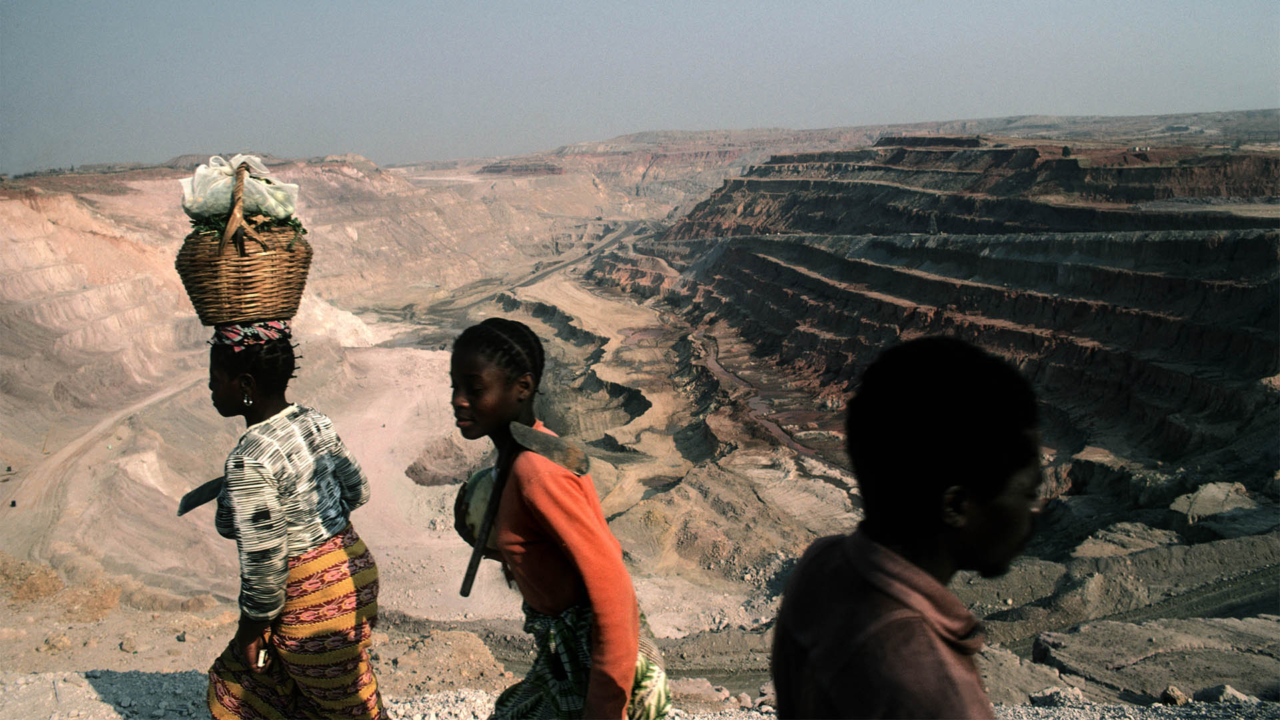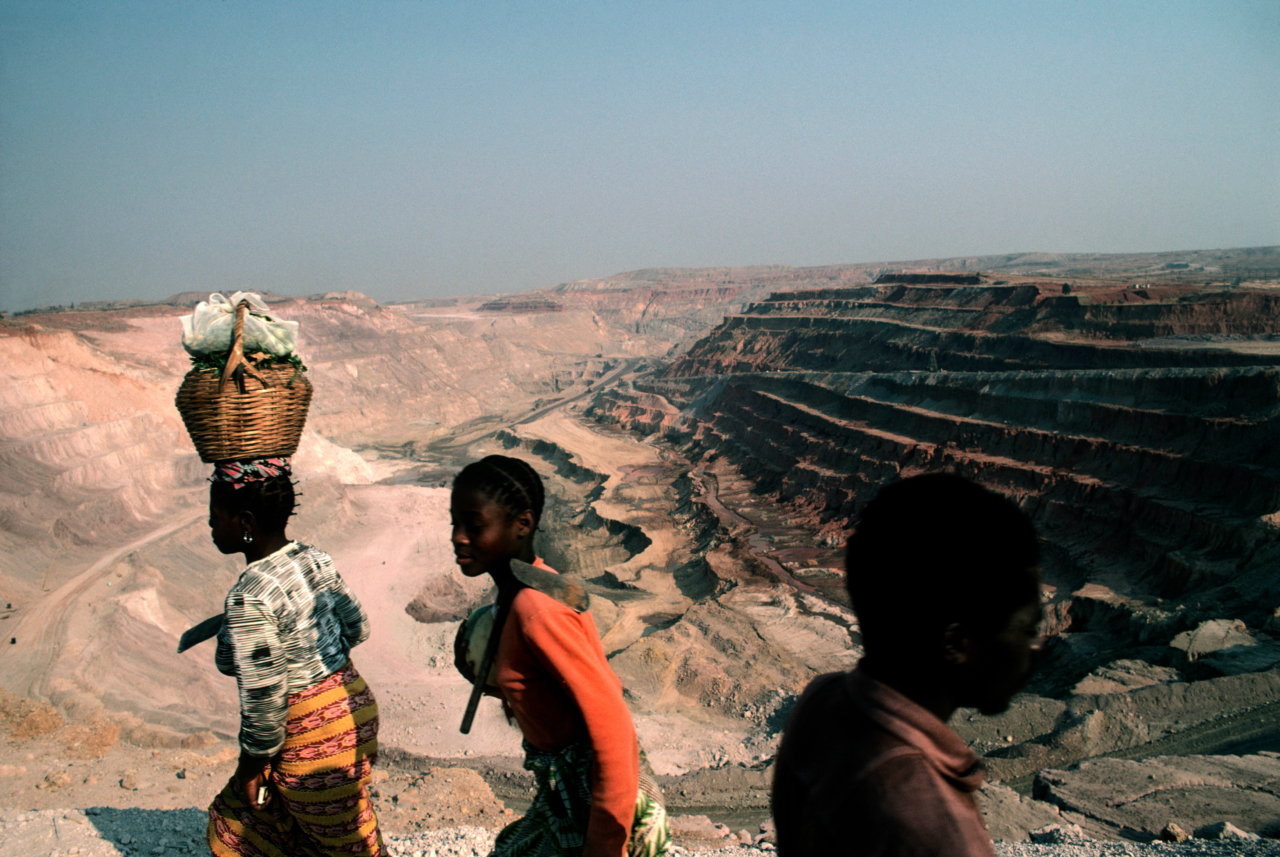

Photograph by Alex Webb / Magnum
WORDS BY YESSENIA FUNES
Jean received a degree in computer sciences, yet he still ended up working in the cobalt mines of the Congo. In the Democratic Republic of Congo (DRC), most jobs exist only in informal sectors like agriculture and mining, according to the International Labour Organization. College graduates like Jean struggle to find employment in what they studied. Instead, he spent five years mining the critical mineral in the Kolwezi area—until one day a stone fell on his feet at work, resulting in a double amputation.
“Now, I am unemployed,” Jean told me in French on a video call through a translator. He is only using a pseudonym to protect his identity as he speaks out. “When I was working before, I found myself less alone. Now, I have become like a beggar.”
Cobalt is required in all sorts of batteries necessary to decarbonize our society: batteries that power electric vehicles (EVs) and e-bikes and that store energy from wind and solar to stabilize the grid. In 2023, the U.S. saw a record number of EVs sold: 1.2 million. The E.U., meanwhile, plans to ban gas cars by 2035. To execute the transition off dirty fossil fuels, these countries will need a whole lot more cobalt. Some 70% of the world’s silver-blue metal sits beneath the DRC, where miners like Jean lack adequate protections on the job. Miners aren’t the only ones affected; residents who live near mines must also contend with air, water, and noise pollution. Some people are forced off their land altogether if valuable cobalt remains untapped underneath.
And yet, many of these communities don’t want to see these mines disappear from their homeland. They need the work, but they want justice when things go awry.
“We hope to have [the mining industry],” Jean said. “But what do we hope for? That when we are disabled, we can get help. This is our wish.”
Shouldn’t their opinions carry weight? After all, the world needs the DRC’s cobalt just as its people need jobs. In order to meet the greenhouse gas reduction goals of the Paris Agreement, demand for cobalt is estimated to increase by 60% to 70% over the next two decades, according to the International Energy Agency. The metal’s future depends on how battery technology evolves, as well as climate policy. Current access to cobalt, however, comes at an immense cost.
Mining is a dirty business no matter the mineral or country. Most cobalt is mined as a byproduct of copper, but even in the U.S., a cobalt and copper mine that closed in 1982 became a Superfund site because acidic wastewater polluted nearby creeks and groundwater. To avoid such environmental harms, mines must be designed with protections in place, including regular water monitoring.
“We hope to have the mining industry. But what do we hope for? That when we are disabled, we can get help. This is our wish.”
In the DRC, many mines are small-scale, informal, and poorly regulated. These are prone to deadly collapses and landslides. In 2019, at least 43 artisanal miners died in the Kolwezi area where Jean worked after such an incident. Workers—sometimes children or mothers with infants—go in with little more than an axe and their hands. Many come out with lifelong injuries; Jean’s situation is not unique. Still, artisanal mining is often the better-paying or only employment option available to people trying to escape poverty.
“[Artisanal mining] is hugely important,” said David Sturmes-Verbeek, the cofounder and director for fundraising and partnerships of The Impact Facility, a U.K.-based nonprofit that aims to ensure mineral-rich communities benefit from their resources. “If you think from a community perspective, it is the easiest way for local populations of varying educational backgrounds to participate in the mineral economies in a context where industrial mining, especially on the African continent, is largely done through foreign companies.”
Indeed, 88% of the country’s cobalt comes from large industrial mines, most of which are owned by Chinese companies. These sites face their own challenges. A March report from Rights and Accountability in Development (RAID), a U.K.-based human rights group, and DRC-based environmental group African Resources Watch found that industrial mining sites in the DRC were behind toxic pollution creating public health and ecological hazards in nearby communities. Report authors interviewed 144 local people, and nearly all of them saw negative consequences on agriculture due to water contamination. More than half also identified gynecological and reproductive health issues among women.
Dorcas Tshimpe, a community figure in Kolwezi who studied public health and works closely with miners who have suffered injuries, joined Jean on the video call where she shared concerns about babies born with malformations, likely because their pregnant mothers worked in the mines or drank polluted water.
“Some women were saying that their babies had been born with only two fingers or without hands or without feet,” said Anaïs Tobalagba, report author and researcher with RAID. “Some were saying that their kids had been born with cleft palates, as well.”
In and around Kolwezi, industrial-scale mines are also pushing people off their land, per a 2023 report from Amnesty International and the local human rights group Initiative pour la Bonne Gouvernance et les Droits Humains (IBGDH). The neighborhood of Cité Gécamines once featured homes with running water and electricity, but many residents were forced to leave under orders from Compagnie Minière de Musonoie Global SAS (COMMUS), a joint venture between a Chinese company and the DRC state mining company. Former residents weren’t given enough compensation to maintain their living standards, so many can no longer access running water and electricity in their new homes. The report also documented soldiers burning down another village to make way for mine expansion and sexually assaulting a woman trying to harvest her crops.
“We must push the Congolese state, the Congolese leaders, to work effectively so that the extraction of minerals can contribute to the sustainable development of local communities.”
“If there’s no coherent policy conversation and norm creation that gives an opportunity for these communities to have their interests represented above and beyond economic growth, what you end up with is sacrifice zones where people just have to give up their homes, their schools, their communities, and their land for the sake of mineral extraction that does not benefit them,” said Candy Ofime, report coauthor and climate justice researcher with Amnesty International.
IBGDH President Donatien Kambola Lenge agrees that mining must benefit local communities—for example, by supporting clean energy projects in the DRC. “We are going to make the energy transition for Westerners, for Asians, but not for the Congolese? Because when there is a Congolese person who does not have access to energy, how are you going to talk about the energy transition?” he said in French through a translator.
“We must push companies,” he said. “We must push the Congolese state, the Congolese leaders, to work effectively so that the extraction of minerals can contribute to the sustainable development of local communities.”
Ultimately, local residents should have more of a say as the cobalt industry continues to expand in the country. And that’s a big part of the issue, explained Sarah Katz-Lavigne, a postdoctoral researcher at the University of Antwerp who’s closely studied cobalt mining in the DRC.
“There’s a need to take a step back and try to have a better understanding of what miners are actually seeking,” she said. “That doesn’t seem to be happening right now.”
The big concern she has heard from communities on the ground is pricing. Miners don’t receive payments commensurate with cobalt’s worth. They have limited negotiating power with producers and sellers.
“People underestimate the value of all the minerals that are flowing out of the region and the distribution benefits, which are widely skewed in favor of industrial actors,” Katz-Lavigne said. “That’s another thing that I don’t think gets really talked about: Who is benefiting? To what extent? How complete is the picture of things when it’s so focused on things like child labor?”
Still, some workers want to see the tech companies that buy cobalt for their products held accountable for their alleged reliance on child labor. Jean is planning to sue Apple, Alphabet, Dell, Microsoft, and Tesla for just that in forthcoming litigation where he will be listed as John Doe 20. An earlier case that this new one will replace was dismissed in March, but the team is determined to refile a new lawsuit soon.
Terry Collingsworth, the lawyer representing Jean with his organization International Rights Advocates, sees this dynamic as an extension of Africa’s brutal history with colonialism and slavery. “Cobalt is an excellent and modern example of the modern colonialism that is going on all over the world,” he said.
The clean energy transition the climate crisis requires does not need to be rooted in the same dangerous practices that led the world to this point. Indeed, the climate justice movement demands a new world where frontline communities can finally prosper as fossil fuels phase out—not a world where alternative energy sources replicate the same exploitation and harm.
Translation by Julia Webster Ayuso
Correction,
May 1, 2024 9:13 am
ET
Donatien Kambola Lenge's full name was corrected.
Congo’s Clean Energy Cobalt Mines Don’t Have to Be So Dirty